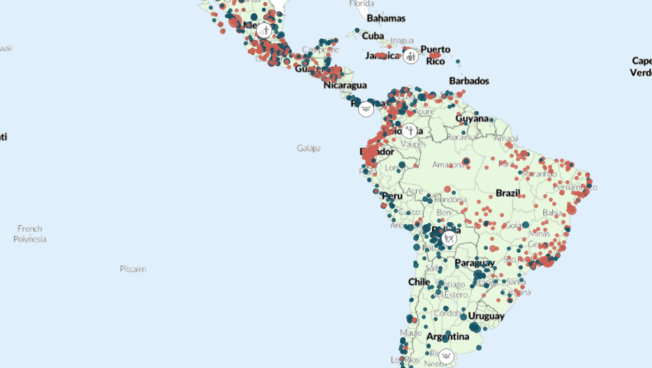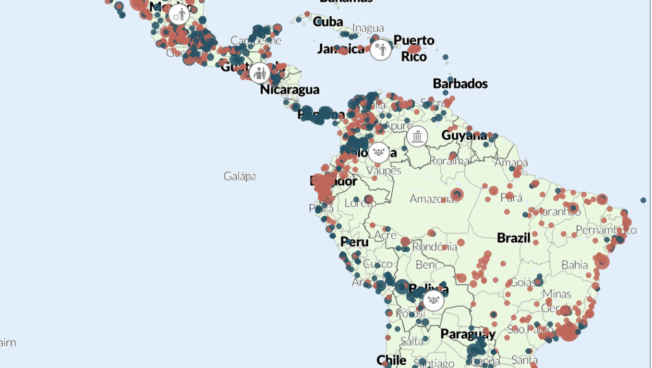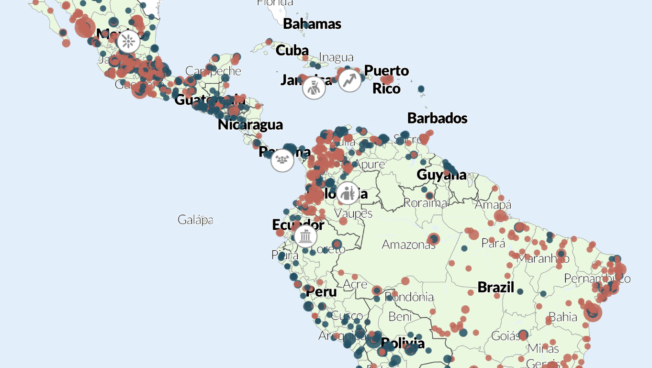Regional Overview
Latin America & the Caribbean
January 2024
Posted: 9 February 2024
Key Developments
Violent & Military Events
Demonstrations & Strategic Developments
3 Jan. | Nicaragua
Clashes between rival armed settlers kill one person in Indigenous Wangki Twi Tasba Raya territory
4 Jan. | Mexico
La Familia Michoacana carries out a drone attack against a community in Buenavista de los Hurtado, Guerrero, killing 30 civilians
10 Jan. | Costa Rica
Armed suspects shoot and injure a leader of the Nicaraguan opposition in San José
14 Jan. | Colombia
The government and the FARC-EMC dissident group sign a six-month extension to their ceasefire
14 Jan. | Haiti
The Belair gang clashes with rival gangs in Solino, Port-au-Prince, leaving at least 20 dead
14 Jan. | Nicaragua
The government expels Bishop Álvarez of Matagalpa and 18 other priests from the country
15 Jan. | Guatemala
Bernardo Arévalo is sworn in as president despite delays in the installment of the new legislature
17 Jan. | Ecuador
Chone Killers gang members kill an attorney investigating the attack on TC Television in Guayaquil
19 Jan. | Mexico
Residents of Lerdo de Tejada, Veracruz, set the municipal palace ablaze amid protests over police violence
20 Jan. | Peru
Relatives of protesters killed in the 2022 upheaval demonstrate against President Dina Boluarte’s visit to Ayacucho
21 Jan. | Brazil
About 200 landowners attack an Indigenous community in Potiraguá, killing one leader and wounding another
21 Jan. | Ecuador
Police capture a leader of the Colombian FARC Oliver Sinisterra dissident faction in Imbabura
22 Jan. | Haiti
Gunmen kill four demonstrators during protests against Prime Minister Ariel Henry in Jeremie
26 Jan. | Venezuela
The Supreme Court of Justice ratifies the exclusion of María Corina Machado from the presidential race
27 Jan. | Haiti
G-9 affiliated gangs clash in La Saline, Port-au-Prince, resulting in at least 29 dead
29 Jan. | Colombia
The FARC-EMC dissident group kills two soldiers in Magüí Payán, Nariño, in violation of the ceasefire
 Bolivia: Increasing political tensions drive increased demonstration activity
Bolivia: Increasing political tensions drive increased demonstration activity
Worsening divisions within the ruling Movement for Socialism (MAS) party between President Luis Arce and former President Evo Morales supporters led to an almost tripling of demonstration activity throughout the country in January — at 171 events — compared to the previous month. Morales’ supporters, mostly coca leaf farmers and other farmer groups, installed roadblocks across six regions, demanding the removal of Constitutional Court (TPC) magistrates and their replacement via judicial elections. Although most of the demonstrations were peaceful, almost one in every 10 ended with a clash between pro-Morales and anti-Morales groups or between demonstrators and police in Chuquisaca, Cochabamba, La Paz, Oruro, and Santa Cruz departments. In December, the TCP ruled that the Bolivian constitution only allows re-election once, preventing Morales from running for a fourth term in the 2025 general elections.1Infobae, ‘Tension en Bolivia: el Gobierno denuncio que los campesinos son amenazados por los seguidores de Evo Morales para bloquear las rutas,’ 28 January 2024 Tensions between Arce and Morales, who are battling for control of the MAS party, have been increasing over the last months since Morales announced his presidential candidacy in September 2023.2Fabiola Chambi, ‘¿Que esta pasando en Bolivia? La pugna entre Luis Arce y Evo Morales de cara a las elecciones del 2025,’ Voz de América, 12 October 2023
 Colombia: Recently elected local government officials continue to be targeted as they take office
Colombia: Recently elected local government officials continue to be targeted as they take office
At least 10 local officials were victims of attacks in January, as many took office after being elected during the October 2023 regional elections. On 6 January, assailants from the Los Palmeños gang kidnapped the registrar for the Chocó department. The Los Palmeños gang is a local organization with ties to the National Liberation Army (ELN) that, according to the Attorney General’s office, is increasingly outsourcing kidnappings amidst talks with the government and despite publicly committing to stop this practice.3Nelson Ricardo Matta Colorado, ‘El misterio del rapto y liberación del registrador Jefferson Murillo,’ El Colombiano, 24 de enero 2024 ; Portafolio, ‘Fiscalia denuncia tercerizacion de secuestros por parte del Eln,’ 4 January 2024 However, the ELN’s involvement remains unclear. On the same day, gunmen attacked the newly sworn-in mayor of Tumaco, Nariño. In Valle del Cauca, at least three mayors and municipal council members have also received threats from armed groups following the killing of a councilman in Tuluá on 31 December, a day before starting his third consecutive term.4Noticias RCN, ‘Tres alcaldes de Valle del Cauca denuncian amenazas, tras casi 20 días de su posesión,’ 19 January 2024; El País, ‘Disidencias de las Farc lanzan nueva amenaza contra concejales en Candelaria’, 22 January 2024
Colombia’s Pacific region has been a hotbed of violence against political figures who have opposed criminal interests and showcased strength to the government. These attacks are attributed to rebels and criminal armed groups active in the region. Although ceasefires with the Central General Staff dissident faction of the Revolutionary Armed Forces of Colombia and the ELN were extended, these attacks continued, challenging the government’s ‘Total Peace’ strategy to end Colombia’s armed conflicts through negotiations. Moreover, these events confirm an increase of violence targeting local officials around local electoral cycles: ACLED records 151 events in 2023, when local elections were held, compared to 66 in 2022.
 Costa Rica and Nicaragua: Repression of Nicaraguan dissidents continues at home and abroad
Costa Rica and Nicaragua: Repression of Nicaraguan dissidents continues at home and abroad
On 14 January, the Nicaraguan government released Bishop Rolando José Álvarez along with 18 other detained priests and expelled them from the country.5Vatican News, ‘Nicaragua. Liberados los obispos Álvarez, Mora y otros sacerdotes. Están en Roma’, 14 January 2024 Álvarez was arrested in 2022 and sentenced in February 2023 to 26 years in jail on charges of conspiracy to undermine national integrity and propagation of fake news, after refusing a first attempt to expel him along with 222 other political prisoners who were sent to the US and stripped of their nationality.6BBC, ‘Nicaragua expulsa del país al obispo Rolando Álvarez y a 15 sacerdotes, que van al Vaticano,’ 15 January 2024 ; BBC News Mundo, ‘Nicaragua libera a 222 opositores presos, los deporta a EE.UU. y les quita la nacionalidad,’ 9 February 2023 Reports have counted 740 government actions against Catholic leaders since April 2018 in retaliation for their apparent support of the 2018 anti-government demonstrations.7Wilfredo Miranda, ‘Destierros, detenciones y 740 agresiones: la persecución de Ortega y Murillo contra la Iglesia católica se agrava en Nicaragua,’ El País, 22 December 2023 Meanwhile, concerns over repression against President Daniel Ortega’s opponents spread beyond the border following an attack against prominent Nicaraguan dissident Joao Maldonado on 10 January by unidentified perpetrators in San José, Costa Rica. Maldonado protested against Ortega’s government in 2018, and authorities later accused him of the murder of public officials,8Despacho505, ‘Radio oficialista tilda de «delincuente» al opositor baleado por sicarios en Costa Rica, Joao Maldonado,’ 11 January 2024 forcing him to flee the country. ACLED records five attacks targeting Nicaraguan activists and politicians living in Costa Rica between January 2018 and 2024.
 Ecuador: The government declares a state of internal armed conflict
Ecuador: The government declares a state of internal armed conflict
On 8 January, President Daniel Noboa issued a state of emergency following the escape of Los Choneros gang leader Jose Adolfo Macías, known as Fito, from a prison in the Guayas province.9Gonzalo Solano, ‘Presidente de Ecuador decreta estado de excepción, tras presunta fuga de la carcel de lider de narco,’ AP, 8 January 2024 The measure sparked a wave of gang violence throughout the country, with at least 16 prison riots recorded across nine provinces, coordinated explosive attacks, police kidnappings, and even the invasion of a live TC Television broadcast in Guayaquil. In response to the surge of gang violence, Noboa declared the country in a state of armed conflict on 9 January, identifying 22 criminal organizations as “terrorist organizations” and authorizing the military to combat them.10BBC News Mundo, ‘El presidente Daniel Noboa declara la existencia de un conflicto armado interno en Ecuador y ordena al Ejército restablecer el orden tras varios atentados y la toma de un canal de TV,’ 9 January 2024 Authorities reported the arrest of 5,000 people linked to the gangs in January. Public acts of violence have not ceased, however, including the killing of a state attorney who was investigating the takeover of TC Television by Chone Killers gang hitmen.11Deutche Welle, ‘Ecuador: 2.500 detenidos en conflicto armado interno,’ 20 January 2024 President Noboa’s response comes amid increasing violence in and outside jails driven by disputes between criminal groups over the control of drug-trafficking routes and other illicit economies. The state’s militarization has raised concerns about further spikes in gang violence and human rights abuses,12Primicias, ‘Human Rights Watch: declaración de conflicto armado en Ecuador es inadecuada,’ 11 January 2024 and prompted neighboring Peru to declare a state of emergency in five border departments.13El Comercio, ‘Gobierno declara estado de emergencia en la zona de frontera con Ecuador y Colombia’, 10 January 2024
 Haiti: Rebel leader stirs anti-government demonstrations across the country
Haiti: Rebel leader stirs anti-government demonstrations across the country
Calls for a rebellion to oust Prime Minister Ariel Henry by Guy Philippe, former police officer and rebel leader, prompted a five times spike in demonstrations in January compared to the month prior. Philippe returned to Haiti from the United States in November 2023 after serving a sentence for money laundering.14Gazette Haiti, ‘Guy Phillipe/ Appel à la désobéissance civile: paralysie des activités à Jérémie, Miragoâne, Ouanaminthe et Carrefour,’ 15 January 2024; Evens Sanon, ‘Authorities in Haiti hold former rebel leader Guy Philippe after the US repatriated him,’ Associated Press, 1 December 2023 Philippe has declared he would not seek to seize power with force but claimed that if popular mobilization forced Henry out of office, “it would be a legitimate coup.”15Frances Robles, ‘An Unlikely New Threat to Haiti’s Stability: An Armed Environmental Group,’ New York Times, 25 January 2024 Almost half of the 86 demonstration events recorded in January turned violent, including some when violence was used against protesters. On 22 January, unidentified gunmen shot and killed at least four demonstrators in Jeremie. In Ouanaminthe, police officers clashed with members of the Surveillance Brigade for Protected Areas — an armed brigade affiliated with the Ministry of Environment — which has sworn allegiance to Philippe and mobilized over the dismissal of their director by Henry’s government in an attempt to retake control of these units.16Jean Junior Celestin, ‘Jeantel Joseph révoqué, nouvelle directive pour l’Agence nationale des aires protégées,’ Le Nouvelliste, 23 January 2024 The wave of unrest in Haiti highlights the widespread popular discontent toward Henry that Philippe is trying to capitalize on. Such unrest is likely to grow after 7 February, the date by which Henry was supposed to leave power according to an agreement he signed with representatives of political parties, civil society organizations, and the private sector on 21 December 2022.17Gazette Haiti, ‘Haiti-Crise: Guy Philippe appelle à la « désobéissance civile » dès demain lundi dans le cadre de sa révolution,’ 14 January 2024; International Crisis Group, ‘Les gangs en Haïti : une mission étrangère peut-elle briser leur emprise ?,’ 5 January 2024 Against this backdrop, the ACLED CAST tool foresees an increase in political violence, particularly violence against civilians, in the next couple of months.
 Mexico: Conflict between CJNG and the Sinaloa Cartel intensifies in Chiapas state
Mexico: Conflict between CJNG and the Sinaloa Cartel intensifies in Chiapas state
A turf war between the Jalisco New Generation Cartel (CJNG) and the Sinaloa Cartel drove a 40% increase in violence compared to the previous month, resulting in some of the highest levels of violence recorded in Chiapas in recent years. On 4 January, a clash between the criminal organizations in Chicomuselo left at least 20 people dead, including civilians. The violence followed an attempt by the Sinaloa Cartel to seize CJNG-controlled baryte mines in the area. Following violence recorded in Chicomuselo and at least three other nearby municipalities, around 2,300 residents fled the area.18Centro de Derechos Humanos Fray Bartolomé de las Casas, ‘Urge atender la actual crisis de desplazamiento en la región Frontera-Sierra de Chiapas,’ 23 January 2024 Some residents also blocked roads and even clashed with military forces trying to pass through the area, denouncing their abuses, while military officers have accused residents of colluding with criminals.19Ernesto Jiménez, ‘Denuncian a militares por enfrentamiento con campesinos que dejó dos muertos en Chiapas,’ Infobae, 20 January 2024 Against a backdrop of intense fighting between the cartels, attacks against civilians, including the killing of an Indigenous leader in Tila and a mayoral candidate in Suchiate, have also continued at high levels.
See More
See the Codebook and the User Guide for an overview of ACLED’s core methodology. For additional documentation, check the Resource Library. Region-specific methodology briefs can be accessed below.
Links:








